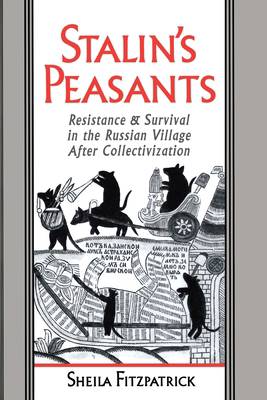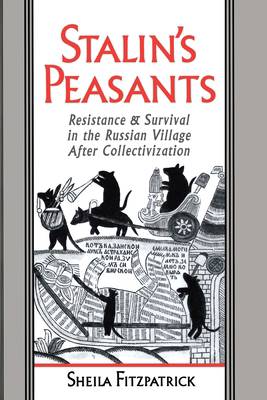
Bedankt voor het vertrouwen het afgelopen jaar! Om jou te bedanken bieden we GRATIS verzending (in België) aan op alles gedurende de hele maand januari.
- Afhalen na 1 uur in een winkel met voorraad
- In januari gratis thuislevering in België
- Ruim aanbod met 7 miljoen producten
Bedankt voor het vertrouwen het afgelopen jaar! Om jou te bedanken bieden we GRATIS verzending (in België) aan op alles gedurende de hele maand januari.
- Afhalen na 1 uur in een winkel met voorraad
- In januari gratis thuislevering in België
- Ruim aanbod met 7 miljoen producten
Zoeken
Stalin's Peasants
Resistance and Survival in the Russian Village After Collectivization
Sheila Fitzpatrick, Shelia Fitzpatrick
Paperback | Engels
€ 128,95
+ 257 punten
Omschrijving
Drawing on newly-opened Soviet archives, especially the letters of complaint and petition with which peasants deluged the Soviet authorities in the 1930s, Stalin's Peasants analyzes peasants' strategies of resistance and survival in the new world of the collectivized village.
Stalin's Peasants is a story of struggle between transformationally-minded Communists and traditionally-minded peasants over the terms of collectivization--a struggle of opposing practices, not a struggle in which either side clearly articulated its position. But it is also a story about the impact of collectivization on the internal social relations and culture of the village, exploring questions of authority and leadership, feuds, denunciations, rumors, and changes in religious observance. For the first time, it is possible to see the real people behind the facade of the "Potemkin village" created by Soviet propagandists. In the Potemkin village, happy peasants clustered around a kolkhoz (collective farm) tractor, praising Stalin and promising to produce more grain as a patriotic duty. In the real Russian village of the 1930s, as we learn from Soviet political police reports, sullen and hungry peasants described collectivization as a "second serfdom," cursed all Communists, and blamed Stalin personally for their plight.
Sheila Fitzpatrick's work is truly a landmark in studies of the Stalinist period--a richly-documented social history told from the traumatic experiences of the long-suffering underclass of peasants. Anyone interested in Soviet and Russian history, peasant studies, or social history will appreciate this major contribution to our understanding of life in Stalin's Russia.
Stalin's Peasants is a story of struggle between transformationally-minded Communists and traditionally-minded peasants over the terms of collectivization--a struggle of opposing practices, not a struggle in which either side clearly articulated its position. But it is also a story about the impact of collectivization on the internal social relations and culture of the village, exploring questions of authority and leadership, feuds, denunciations, rumors, and changes in religious observance. For the first time, it is possible to see the real people behind the facade of the "Potemkin village" created by Soviet propagandists. In the Potemkin village, happy peasants clustered around a kolkhoz (collective farm) tractor, praising Stalin and promising to produce more grain as a patriotic duty. In the real Russian village of the 1930s, as we learn from Soviet political police reports, sullen and hungry peasants described collectivization as a "second serfdom," cursed all Communists, and blamed Stalin personally for their plight.
Sheila Fitzpatrick's work is truly a landmark in studies of the Stalinist period--a richly-documented social history told from the traumatic experiences of the long-suffering underclass of peasants. Anyone interested in Soviet and Russian history, peasant studies, or social history will appreciate this major contribution to our understanding of life in Stalin's Russia.
Specificaties
Betrokkenen
- Auteur(s):
- Uitgeverij:
Inhoud
- Aantal bladzijden:
- 416
- Taal:
- Engels
Eigenschappen
- Productcode (EAN):
- 9780195104592
- Verschijningsdatum:
- 11/01/1996
- Uitvoering:
- Paperback
- Formaat:
- Trade paperback (VS)
- Afmetingen:
- 156 mm x 235 mm
- Gewicht:
- 576 g

Alleen bij Standaard Boekhandel
+ 257 punten op je klantenkaart van Standaard Boekhandel
Beoordelingen
We publiceren alleen reviews die voldoen aan de voorwaarden voor reviews. Bekijk onze voorwaarden voor reviews.









